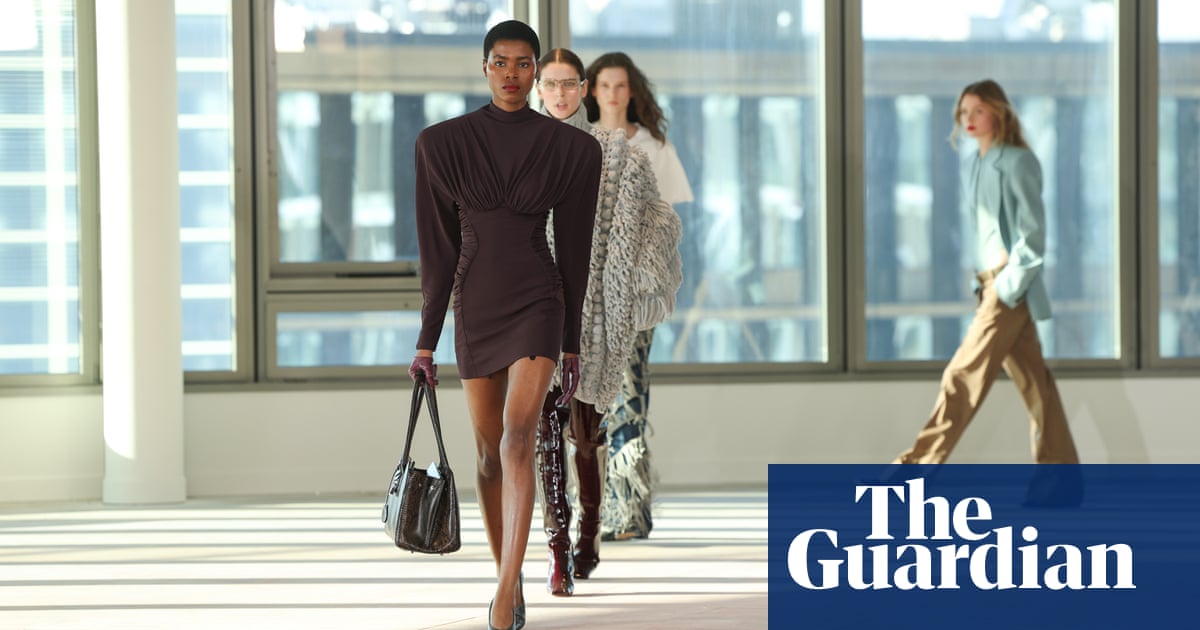On the second day ofParis fashion week, Stella McCartney took Kate Moss, Cameron Diaz and Brigitte Macron to the fourth floor of a tower block, where she turned an imaginary office space into a full-on 80s glamour assault.
Hemlines were high, but the thigh-tracing boots peeking out from under suits were somehow higher. Pole dancers spun in crystal leotards by photocopiers, and through lace tights we even got a bare bottom. “I wanted to bring the sexy back,” said McCartney backstage. “It’s all legal!”
Another Paris brand inadvertently capitalising on the Oscars success of Anora – Dior hit the front pages after dressing two Oscar winners – the British designer’s show was bluntly titled “from laptop to lapdance”.
The idea, said McCartney, “was a bold day-to-night wardrobe for the working woman – and our company is 90% women”. However, apart from the broad-shouldered suits and hooded coats, the emphasis was on skin-tight gowns and lipstick-red partywear.
Tapping into the buzzy new aesthetic known as “boom boom”, coined by the trend forecaster Sean Monahan of normcore-fame, it refers to the conspicuous consumerism of the 1980s. Think power shoulders, sunglasses worn inside, and Pretty Woman boots. Think this collection.
In the label’s almost 25 years, McCartney has never used leather, feathers, fur or skins. Instead, she has built her career on trying to show that ethical choices don’t mean compromising on glamour – and has been preaching the merits of upcycling long before hotels were telling us to reuse our towels.
Her latest collection was, she said, 96% sustainable. Nepo baby or not, she has been pioneering in this respect – the first designer to use vegan leather, it is now rare to see a show that doesn’t nod in some ways towards sustainability.
Such is her ability to turn grapes, apples and mushrooms into totes and chain-handle bags, her nickname on the front row is “the grocer”. Other brands have followed suit. Sequins dripping from dresses were made from plants here, and on Tuesday the Danish brand Ganni showed sequins made from seaweed. The boots and bags were made from mushroom (or mycelium), while Ganni showed bags made from olive oil “leather” (or Oleatex).
Sign up toFashion Statement
Style, with substance: what's really trending this week, a roundup of the best fashion journalism and your wardrobe dilemmas solved
after newsletter promotion
Last month, McCartney bought back the minority stake held since 2019 by thebiggest fashion conglomerate in the world, LVMH. Though she remains an ambassador on sustainability there, it was the first time she has been an independent designer since graduating.
Show days are tense for any designer – it’s not simply about balancing the eco-books, it’s about selling clothes. But judging by the front row, the party isn’t over – it just looks a little greener.
Earlier that day, The Row won over the fashion crowd, not with a trend but a tuck. A blue shirt half-tucked and slightly to one side, it demonstrated that fashion is as much about how you wear the clothes as the clothes themselves.
Founded in 2006 by the former child actors Mary-Kate and Ashley Olsen, this brand is as well known for its interpretations of everyday items – shirts, scarves, ballet flats – as it is for its four-figure price tags. The pair rarely give interviews and for the second year running attenders were asked to “refrain from capturing or sharing any content during your experience” – borderline sacrilege for the TikTok generation.
The clothes were chic and monastic. Coats came cocoon-shaped. Forked scarves hung from six types of trenchcoat. None of the models wore shoes, just tights. A quieter more rarefied type of luxury, but one that still appeals to an awful lot of women.
